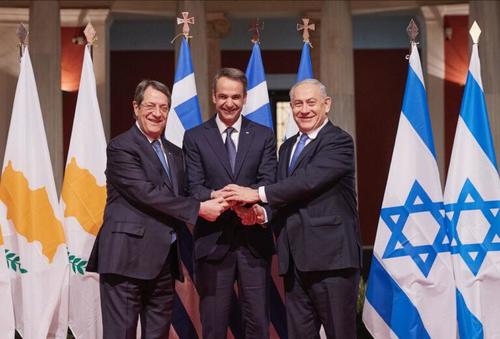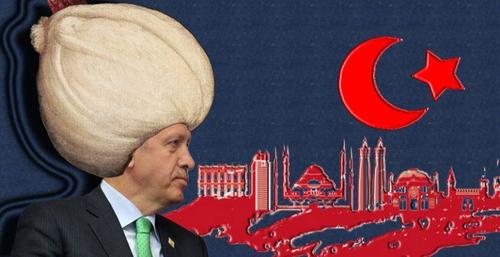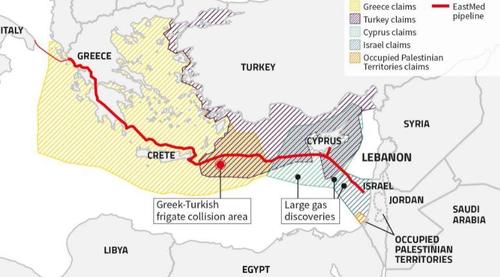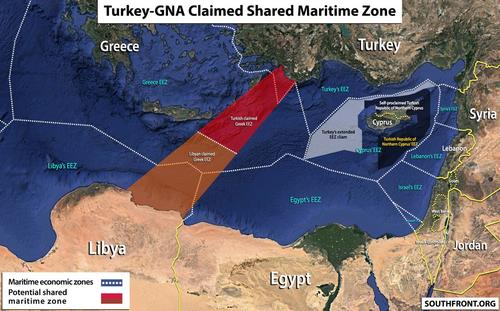The waters of the eastern Mediterranean have become the scene of a low-intensity war. The goal is to control the energy resources that extend into the seabed from the coast of Greece to Israel. The maritime area of the eastern Mediterranean is one of the main areas of energy interest. In 2009, the Leviathan gas field (450 billion m3) was discovered, about 130 kilometers offshore from the Israeli city of Haifa. Subsequent explorations in this sea area have shown that large quantities of gas also exist in adjacent areas. In particular, the Tamar fields (about 318 billion m3) and some minor fields, including Dalit (55 billion m3) and Karish and Tanin (respectively about 8 and 55 billion m3), were discovered off the Israeli coast. They will allow Israel to meet domestic consumption and export part of its production. Then came, in 2011, the discoveries in the Cypriot waters of Aphrodite (about 129 billion m3) and Calypso (with a potential of 170-230 billion m3).

Greek Energy and Environment Minister Kostis Hatzidakis, Minister of Energy, Commerce and Industry of the Republic of Cyprus Giorgos Lakkotrypis and Israeli Energy Minister Yuval Steinitz signed in Athens the intergovernmental agreement on the construction of the EastMed gas pipeline in December 2020
Whose are those energy resources? How and where will that wealth be distributed?
All the key players of that geopolitical quadrant claim their rights over those waters and the exploitation of the resources contained in the subsoil. The first move to conquer those seas is Turkey. Erdogan’s expansionist policy begins at the end of 2018, first with a series of hostile naval patrols against Cyprus, then with a series of drilling off the island shared with Greece. Turkish research activities arouse protests from the international community. So, the EU imposes sanctions on Turkey. But they are almost a caress.

Then, in compliance with the neo-Ottoman project of “Blue Homeland”, Ankara signs, in November 2019, an agreement with the Libyan transitional government, then chaired by Fayez Al Serraj, for the exclusive exploitation of the maritime EEZ and for cooperation military. A punch in the face of Greece. In fact, on that same stretch of sea, another cooperation treaty entered into force in the summer of 2020, signed between Greece and Egypt. For Ankara it is a blow to the heart. Within days, the Ankara government sends the Oruc Reic seismic research ship to inspect what it considers to be its exclusive sea area. Too bad, even the Greeks also think the same. The incident occurred on 12 August 2020. The Oruc Reis is sailing escorted by a fleet of Turkish ships and is approached by a Greek naval patrol. Eventually the Greek frigate Limnos and the Turkish Tgc Kemalreis will clash in this absurd sea duel. Greece and Turkey are both members of NATO. But national interests come first.
To understand the importance of that incident, it is necessary to look carefully at the map of the pipelines under construction. That naval crash seems to be only the anticipation of a geopolitical conflict. A conflict that risks becoming more complicated: the two frigates collided exactly in the middle of Eastmed’s route.

What exactly is Eastmed and what can its real geopolitical value be?
EastMed is a pipeline that must connect the Levantine basin (in practice, Israel) with the gas distribution networks in Europe. It is a project carried out in joint ventures by Depa (the national gas company for Greece) and by Edison, an Italian-French multinational in the energy sector. The project was blessed by the European Commission which considered it strategic for the European Union. The pipeline route is over 1900 kilometers, 1300 offshore and 600 onshore. According to forecasts, the pipeline will start from the Israeli natural gas reserves of the Levant Sea basin, and then go to Cyprus, Crete and end in Greece. Subsequently, the gas from Greece will reach Italy through a further pipeline. The project, according to estimates, has a value of about 6 billion euros and, within 7 years, will meet 10% of the European Union’s natural gas needs. But in reality nothing has been decided yet. From a geopolitical point of view, that gas pipeline serves to reduce the energy dependence that Europe has on Russia.

That pipeline risks transforming the eastern Mediterranean into a war scenario. For the Eastmed design, the countries interested in the construction of the pipeline came together in a permanent forum. EMGF is its name: it was established in 2018 and was ratified by the acceding countries with a meeting in Cairo in September 2020. Here is the list of adhering countries: Italy, Egypt, Jordan, Israel, Cyprus, Greece and the Palestinian National Authority . The simultaneous presence of Israel and the Palestinian National Authority makes us think. In the report explaining the reasons for the Forum, there are sufficient reasons to imagine a possible escalation of violence. Both for the exclusion of Turkey and Lebanon, which will have no intention of giving up those enormous riches, and for the geopolitical position declared hostile to the Kremlin. It is no secret that the project is against Russia.
The anti-Moscow blockade is strengthened by the forthcoming entry of France and the blessing of the US government. Here is what the Statute of the EMGF says: “Countries such as Turkey and Lebanon do not participate in the Forum due, respectively, to persistent tensions with Greece and Cyprus and the presence of Israel. Interest in the initiative was expressed by France which intends to join the Forum in the near future. The United States views the creation of the EMFG with great interest and would like to join the Forum or at least strengthen cooperation in the Eastern Mediterranean region in the energy sector, as evidenced by the participation of the US Deputy Secretary for Energy at the launch of the Forum in January. 2020. The US, in particular, believes that the gas resources present off the coast of Israel, Cyprus and Egypt constitute an important element for the diversification of European energy supplies, with a consequent decrease in the old continent’s dependence on supplies from Moscow”.
Eastmed is expected to be fully operational in 2025. But there are still many doubts.












